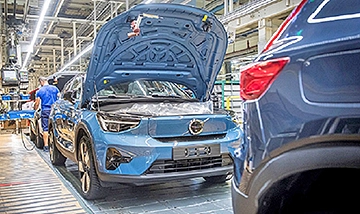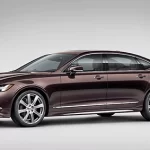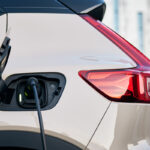Volvo’s factory in Ghent, Belgium will halt output for three days after ships had to be rerouted to avoid violence in one of the world’s busiest shipping lanes, delaying the delivery of gearboxes.
Tesla said it will suspend most car production at its factory near Berlin from Jan. 29 to Feb. 11.
Other automakers are taking steps to avoid production halts.
Stellantis said it is relying on air freight to cope with temporary supply disruptions.
Volkswagen said it is in close coordination with shipping companies and is monitoring the situation closely to assess the impact on production and—as far as possible—avoid it.
Volvo, which builds the XC40 and C40 at its Ghent plant, said it is temporarily halting output in Ghent due to a delayed delivery of gearboxes. Car deliveries, production targets and its other European plant in Gothenburg, Sweden, were not affected by the pause, a Volvo spokesperson said.
Higher Shipping Costs
The attacks by Iranian-backed Houthi militants, in solidarity with Palestinian Islamist group Hamas in its fight against Israel in Gaza, have forced container vessels to avoid the Suez Canal.
Major container ship owners such as Maersk and Hapag-Lloyd have switched Suez Canal-bound ships to the longer route around Africa’s Cape of Good Hope. This has disrupted complex vessel schedules, delayed cargo and sent shipping costs sharply higher.
Rerouting a ship around Africa adds roughly $2 million in fuel costs for each Asia-Northern Europe round-trip. Carriers are recouping that and rolling out other surcharges.
Maersk said it expects the re-routing, which adds about 10 days to a journey from Asia to Northern Europe, will last for the foreseeable future.
Component Supply Weak Spot
Sam Fiorani, vice president at AutoForecast Solutions, which tracks automotive supply chains and production, said more automakers are likely to be affected by the supply disruptions.
Relying on so many key components from Asia, and specifically China, has been a potential weak spot in any automaker’s supply chain, he said.
“Tesla relies heavily on China for battery components, which need to be transported to Europe through the Red Sea, putting production constantly at risk,” he said. “It can’t be believed that they are alone; only the first to reflect the issue.”





